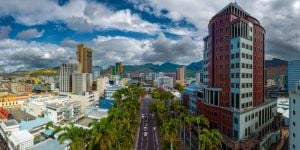
Join us for an in-depth discussion with Myriam Blin, Director of the Charles Telfair Centre, a key institution in the Western Indian Ocean dedicated to addressing regional challenges and enhancing collaboration among researchers, policymakers, and business leaders. She leads training initiatives focused on gender transformation leadership to meet the growing need for inclusive leadership. In this interview, she emphasizes the vital importance of diversity and inclusion in the current professional landscape and explores the distinctive challenges encountered in Mauritius.
As the Director of the Charles Telfair Centre, could you outline the main activities of the Centre and explain their connection to your role in developing and promoting Gender Transformation Leadership training programs?
The Charles Telfair Centre serves as an independent hub aimed at generating and disseminating reliable knowledge addressing the economic, social, and environmental challenges specific to the Western Indian Ocean region. We pride ourselves on being a neutral venue that facilitates dialogue and the exchange of ideas among diverse stakeholders, including researchers, businesses, policymakers, and civil society organizations, all grounded in fact-based research.
Our core activities encompass organizing public events and workshops and producing analytical publications that are accessible to a broad audience. For instance, we recently hosted a workshop focused on the regional talent shortage, where we thoroughly explored issues related to diversity, equity, and inclusion.
While the Centre itself does not directly handle the development of Gender Transformation Leadership programs, I engage with these initiatives in my capacity as a researcher and gender economics expert. I collaborate closely with the Charles Telfair Education Leadership Academy, our parent entity, to design and promote these specialized leadership training programs, aiming to foster transformative leadership in gender-related areas.
What inspired you to launch the Gender Transformation Leadership programs, and how was the concept initially received?
The inception of the Gender Transformation Leadership programs was primarily driven by the needs expressed by various companies. These organizations recognized the importance of enhancing their leadership capabilities in diversity, equity, and inclusion (DEI) as part of their broader DEI strategies. Motivated by various factors—whether ethical convictions, competitive necessity, or challenges related to attracting and retaining talent—these companies understood that promoting diversity and equity transcends mere social responsibility; it is a strategic imperative.
In response to this demand, I facilitated the creation of these programs, collaborating with an international team of experts from Mauritius, Australia, and the United States. Together, we crafted training programs specifically tailored to the unique cultural and business landscapes of Mauritius. The reception was overwhelmingly positive, as participants appreciated the localized approach that respected and addressed the nuanced realities of their environments.
Why are diversity, equity, and inclusion critical for business success?
Diversity, equity, and inclusion (DEI) extend beyond social justice ideals; they are crucial for fostering innovation and enhancing business performance. Our recent workshop on the talent shortage highlighted that a significant segment of skilled female workers remains underutilized in the labor market. Addressing this can help mitigate current talent shortages.
Furthermore, the expectations of younger generations are shifting; they prioritize employment with companies that uphold values of inclusivity and diversity. Businesses that fail to align with these values face challenges in attracting and retaining top talent.
Incorporating DEI into core business strategies not only tackles immediate labor shortages but also boosts a company's long-term appeal and competitive edge, making it more attractive to a broader range of stakeholders.
What are the major challenges you face in implementing these training programs in Mauritius?
Several obstacles impede the implementation of Gender Transformation Leadership programs in Mauritius:
Limited vision: Some companies and their leaders still view diversity primarily as a compliance issue, wrongly believing that DEI initiatives compromise meritocracy. In reality, these measures are crucial for ensuring that meritocracy functions properly by correcting biased processes that unfairly favor certain groups.
Lack of gendered data: Without specific indicators tracking the gender distribution in roles, opportunities, and responsibilities, it is challenging to monitor progress and implement strategic adjustments within companies.
Resistance to change: Implementing these programs requires substantial commitment from top leadership, who must be fully convinced of the need for these transformative actions. Overcoming skepticism and resistance among leaders accustomed to traditional practices is a significant challenge.
How do you measure the success and impact of your Gender Transformation Leadership programs? Have there been notable changes in the Mauritian landscape since their implementation?
To gauge the success and impact of our Gender Transformation Leadership programs, we initiated a comprehensive research project. The first phase of this project focused on studying leadership behavior concerning change, pinpointing the barriers and facilitators to adopting more inclusive practices within organizations.
We are planning a second phase, which will directly assess the effects of our initiatives and training on leadership practices. The objective here is to determine whether these efforts are leading to tangible changes in governance and corporate culture across Mauritius. This systematic approach allows us to not only track progress but also refine our strategies to enhance the effectiveness of our programs.
How do you view the evolution of the Mauritian economic landscape, and what implications might these changes have for your field?
The Mauritian economy is currently experiencing significant transformation, marked by several key trends that have profound implications for leadership and diversity. Factors such as an aging population, brain drain, and evolving expectations from younger generations are prompting companies to reconsider how they attract and retain talent. As highlighted during our recent workshop on the talent shortage at the Charles Telfair Centre, inclusion is emerging as a critical yet underutilized tool for engaging parts of the workforce that are currently marginal in the labor market.
Additionally, the rapid adoption of new technologies necessitates a reassessment of necessary skills and work modalities. This shift also brings to the forefront the challenge of ensuring equitable access to opportunities, particularly in an environment where skill gaps may be expanding.
Moreover, the increasing necessity for companies to incorporate Environmental, Social, and Governance (ESG) considerations into their business strategies is becoming apparent. This includes not only sustainable resource management but also the creation of more inclusive work environments. At a time when DEI policies face considerable scrutiny and potential rollback, it is crucial for companies to resist the temptation to scale back on inclusion initiatives.
Companies that proactively integrate an inclusive and equitable approach into their adaptation strategies will be better equipped to handle these transformations and maintain a competitive edge in this dynamic economic landscape.
In your opinion, what are the essential elements for fostering an inclusive culture within academic and corporate environments?
Creating a truly inclusive culture in both academic and corporate settings hinges on several pivotal elements:
Effective leadership is crucial; leaders must be both convinced of and committed to inclusivity, demonstrating this through their actions and decisions. This involves not only tailored training but also setting a powerful example from the top.
Inclusivity must be embedded into the organization's fundamental operations. This includes integrating inclusive principles into recruitment, professional development, assessment, and compensation policies.
Organizations should cultivate an environment where employees can freely express their experiences and concerns without fear of retaliation. This feedback culture is essential for continuously refining and improving practices.
Tracking inclusion through specific, measurable indicators such as diversity metrics, pay equity, promotion rates, and employee satisfaction is crucial for assessing effectiveness and making informed adjustments.
Raising awareness and training to recognize and deconstruct unconscious biases is necessary. These biases often subtly influence decisions and must be addressed to achieve true inclusivity.



















